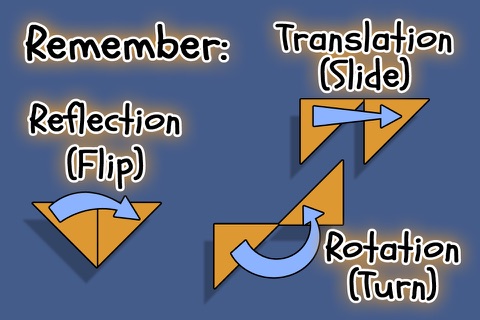
Tangram Chess For Kids: Transformation Math Game
Tangram Chess For Kids: Translations (slides), Rotations (turns) and Reflections (flips)
Tangram Chess is an excellent game for kids. It teaches them strategic thinking, logic and its fun, too! Play with your iOS device or download a printable version.
The Game Of Tangram Chess
Every game of Tangram Chess has its own story. Some are long-drawn out strategic affairs; others can be quick, but complicated, tactical battles. The winner is the player who can out-think his or her opponent, and make the best plans for attack and defence.
Chess is one of the oldest games in the world. Though no-one knows for sure, it was probably invented in India more than a thousand years ago .
Tangram is probably even older then chess. No one knows exactly when the tangram was created but its design was inspired by a table used in the Tang Dynasty in China.
By combining both these two ancient games "Tangram Chess" becomes one of the most interesting and challenging games that you will enjoy for hours at a time.
AIM OF THE GAME: Students will move their pieces across the gameboard and reassemble their tangram on the other side using translations (slides), rotations (turns) and reflections (flips). The first player to reconstruct his or her 5 pieces in the home square on the far side of the game board is the winner.
The armies: There is a Purple army and a Green army. Both armies have the same pieces. Youll notice that the tangram for this challenging game is a more simplified tangram composed of only five shapes: a parallelogram, a square, two different right triangles, and an isosceles triangle
HOW THE PIECES MOVE:
- Translation (slides)
- Reflection (flips)
- Rotation (turns)
HOW TO PLAY TANGRAM CHESS
You need two players. Decide who will be Orange and who will be Blue.
The aim of the game is to move your pieces across the gameboard and reassemble your tangram in the opposing teams square "home base" on the other side using translations (slides), rotations (turns) and reflections (flips).
Your opponent needs to defend their square – either by moving their pieces in blocking the attack with another piece.
LEVELS/MODES:
SINGLE PLAYER GAME (Obstacle Course): You will need to navigate around obstacles and try and reassemble your pieces on the opposite square.
ONE DEVICE - TWO PLAYER GAME: You will have to share a device and take turns, the first one to reassemble their pieces in their opponents square wins.
TWO DEVICES - TWO PLAYER GAME: Using WIFI you can play this game on two devices, you still have to take turns but you can sit on opposite sides of the room while playing.
The two player game mode utilizes WIFI on your device to connect with another device in the same area. Simply click on “Two Player Game - Two Player Game” and then follow the screens. Be patient sometimes it takes a few seconds to connect to another device.
COMMON CORE MATHEMATICAL STANDARD
8.G Understand congruence and similarity using physical models, transparencies, or geometry software.
8.G.1 Verify experimentally the properties of rotations, reflections, and translations:
8.G.2 Understand that a two-dimensional figure is congruent to another if the second can be obtained from the first by a sequence of rotations, reflections, and translations; given two congruent figures, describe a sequence that exhibits the congruence between them.
8.G.3 Describe the effect of dilations, translations, rotations, and reflections on two-dimensional figures using coordinates.



